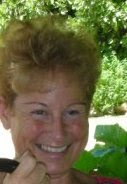
"How does it feel to be a virus?" asks Neta cheerfully as I climb into her car to drive out to the northern checkpoints. Ya'alon, in his blunder of calling Peace Now and the other movements who object to the occupation, has shown his talent for shooting off his mouth first and thinking afterwards. He has now retracted the statement, claiming he now realizes the importance of democratic discourse. Unfortunately, there is no discourse. But yes, I agree with Neta, I am proud to be a virus.
There is a constant flow of workers returning from work and people coming back from shopping in Jenin. Everyone is preparing for Ramadan, and evidently people still like to go to shop in Jenin despite the delays and difficulty it takes to get through the checkpoint. One man complained that he had been waiting for a long time, but proudly showed us a bag of tiny eggplants that he planned to stuff with rice – they cost NIS 8 in Israel, but only 3 in Jenin! The security guard again demanded to see my notebook, and explained “We’re trying to make things easier during Ramadan.”
As we approached the gate at A'anin a soldier asks us, “May I ask what you are doing here?” He is evidently new, and we ask if he has heard of Machsom Watch. Several tractors, a boy with a donkey, and many other young boys were waiting at the gate when we arrived. Things seemed to go smoothly and the soldiers let people through and allowed wagons to pass through loaded with plastic chairs, bags of sawdust, ties, and many other things. At 15:15 one tractor and wagon was delayed as a father with a young boy about 12 showed his documents.
“This only shows that the kid was born,” declares the soldier. (How else did the child come into the world?) After delaying the boy and his father another 15 minutes the soldier, unable to leave them there but unwilling to back down, finally capitulated, but tells the father that his son needs a “special permit”. As the soldiers came to close the gate at 15:30 we asked what the problem was with the father and son. He explained that the boy is over 12 - too old to be included in his father’s permit, and too young to have his own ID at age 16 and receive a separate permit. Thus, he “falls between two stools.”
"But," I asked, "How did the boy get into the seamline zone in the morning??"
He, of course, had not been there to let him across in the morning, but must follow orders now. In the occupation, the law of gravity of what goes up must come down does not hold: Whoever goes out of the West Bank does not necessarily go back in again..
A telephone call to the Liaison and Coordination Administration confirmed that there is no such thing as a “special permit” and that all children under 16 are to be included in their parents’ permit. It appears that there is a lack of coordination between the soldiers in the field and the Liaison and Coordination Administration and the policy is not consistent. At 15:30 everyone had gone through, and we left.
The lower parking lot at Reihan is so crowded with cars and taxis that we have difficulty maneuvering our own car through and could find no place to park. A small number of workers are coming out of the terminal. Everyone is getting ready for Ramadan: As we drove up and began to walk down the sleeve we met several men carrying heavy packages of water, fish, and other groceries, and gave them a hand lugging it all down to the turnstile. They thanked us profusely. All the Moslems that I have met are talking about how difficult the month-long fasting period will be in August-September when the days are hot and long. Since the Moslem calander does not have a leap year system as the Gregorian and Hebrew ones do, the month of Ramadan cycles backwards through the year, moving back one month or so every three years. This means that another nine years of hot, long days until the month of Ramadan is shoved back to the cooler spring months. It will be rough for people who work outdoors and cannot drink water all day.
There are two windows open in the terminal and people are moving through quickly. We listen to the usual complaints about people not being able to go to work in Israel through Reihan Checkpoint in the morning. One man also tells us that the number 27 Egged busses from Hadera to Reihan will not take them back, and we promise to write to the Ministry of Transportation and investigate the matter.
This week, after a year and a half of invitations, my friend from Jordan finally made it up to the Galilee on one of her visits. Determined to show her a part of the country where Arabs and Jews live side by side, I began the tour by showing her the Yehiam battle site and its proximity to the villages of Sheikh Danoun and Abu Snan. I hoped to convey to her just how precarious the situation of the settlements in the Western Galilee was at the time, and that there are villages still standing as opposed to the ones that she was continually referring to that were destroyed. I refrained from much comment, but she silently took pictures of the rusty vehicles scattered throughout the gorge and the old Moslem cemetary above. We then continued to the Arch Cave, where I called upon Dan to serve as tour guide, and we walked around the edge of the cliff and approached the cave by the "surprise" route over the arch. We then continued on to Rosh Hanikra and marveled at the colors and light as the sea crashed into the grottos.



